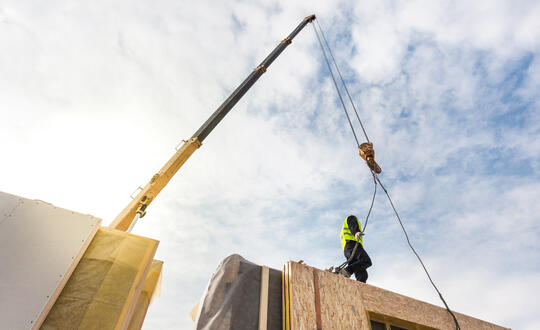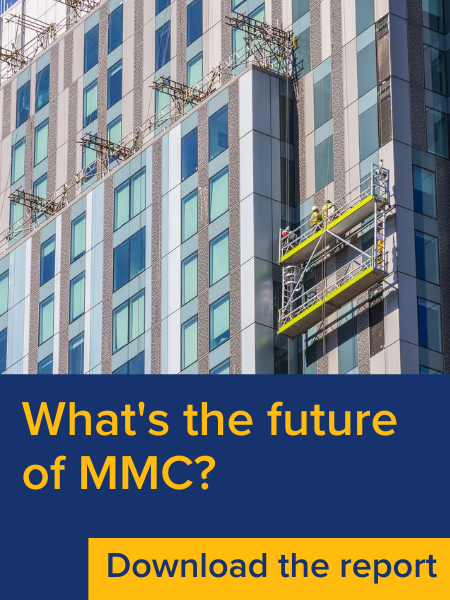
Moving to Modern Methods of Construction (MMC) isn’t just about reducing the labour requirements needed to meet UK house building targets, it’s about reskilling existing workforces to ease pressures and bringing brand new skills to the sector. One of the key challenges is that young people aren’t inspired to start a career in the sector; with construction having dropped out of the top 10 career choices for people aged 22-29 in 2018 and continuing to decline rapidly.
The lack of equality, diversity and inclusion (EDI) within the workforce is also proving a big problem, with few females entering the sector. Construction is not progressing EDI on par with other industrial or traditionally male dominated sectors, with recent UK Government reports showing just 13% of the current construction workforce are female (in comparison to around 20% across energy, mining, and transport). The Construction Leadership Council (CLC) hopes that by introducing formal metrics for EDI across the industry, it’ll support businesses to be more transparent and targeted in its efforts to drive real change and attract new talent.
With skills shortages prevalent across many other sectors, it is not enough to depend on the government to implement change; the industry needs to collaborate end to end, from encouraging children to have aspirations in school, to ensuring the delivery of qualifications aligned to employers’ requirements.
How do we get there?
Opening the door to new skills
The benefit of MMC as an evolving part of the sector is that it is a chance to shake off preconceived views of careers and demonstrate the varied paths, with digital, data and non-manual roles. Technically-able workers who can work with raw materials, build structures and deliver onsite projects will still be at the heart of skills needs, but MMC opens the door to more designers, project management teams and digital architects, MMC innovators and those who will help build adoption for a UK market. Certainly, any skills drive, led by central government or the industry, should consider the development of MMC skills as a vital part of the training mix to aid long term goals. The good news is that there is collaboration between Further Education (FE), Higher Education (HE) and industry; and we need to see more of that to start building this foundation now for the future.
Viewpoint: Northumbria University
We asked Susan Dawson, Senior Lecturer in Architecture and Built Environment at Northumbria University and board member of Constructing Excellence in the North East (CENE), for her views on skills in the sector.
How do we get more young people excited about careers in construction?
“In order to get more people excited about careers in construction, we need to reposition it as the industry of choice. This means celebrating the best aspects of a career in construction and really highlighting the impact that the built environment has on individuals and wider society alike. When looking to attract future talent to the industry, it’s imperative that we highlight how rewarding the job can be.
"Working in construction allows people to really feel like they are making a difference – whether that is to communities in helping solve the housing shortage crisis, making buildings safer and healthier environments or contributing to the fight against climate change by working towards net zero targets with greener buildings. We need to get better at discussing impact and opportunity.
"Without a successful built environment, we miss the opportunity to attract the best of the best talent. Companies should aim to be an employer of choice by raising the profile of how they look after and care for their people (a topic not discussed in the sector) and creating a clear ladder of opportunity from the point of entry. Developing and retaining their own staff resource within the industry is key to long term success. The diversity of a career in construction can be vast, from administrative or trade roles, to management positions and the opportunities to engage in the latest innovation and technology are almost endless. There are paths to suit people from all different educational and professional backgrounds, as well as routes more suited to those without any prior qualifications or experience, and we need to talk about these different routes more.”
How can the sector collaborate with education at every level to change the skills direction now for future needs?
“A call to action to industry and education is needed to make a real step-change. Education and industry need to work together to redefine our roles in the education process and establish common goals to co-develop and co-deliver currency in the curriculum.
"Developing a current and agile curriculum requires the commitment, knowledge and skill of both communities of practice, education and industry. We must adapt and develop an interface where no new learning is lost and industry, learners and their influencers can make informed decisions about engaging and contributing long term. The Constructing Excellence North East (CENE) One Voice strategy and action plan focuses on People as a key action theme and presents a considered action plan enabling participation for all stakeholders.”
Creating a long-term skills pipeline: a net zero approach
Research has found that many young people are motivated by a desire to make a difference to the planet and a global survey of young people aged 15-24 from Plan International has found that 98% of respondents were worried about climate change. MMC represents an opportunity for workers to make a tangible change and work towards net zero targets. However, with young people already uninspired by construction, MMC needs a collaborative approach to showcase what the industry has to offer, and what MMC and greener home building could mean for the future of the UK.
This article is for general information only and reflects the position at the date of publication. It does not constitute legal advice.





